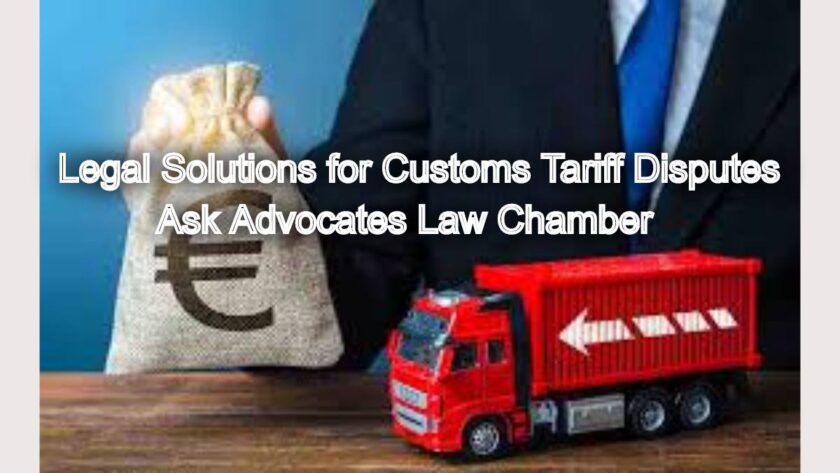Avoid Penalties: Customs tariff disputes represent a significant challenge for businesses engaged in international trade. These disputes often lead to substantial financial penalties and operational disruptions. Therefore, understanding the legal framework and available remedies is paramount. Ask Advocates Law Chamber, your best global force in legal defense, offers comprehensive guidance in navigating these complex legal waters.
Avoid Penalties: Legal Solutions for Customs Tariff Disputes in India: Ask Advocates Law Chamber
Understanding Customs Tariff Disputes
Customs tariff disputes primarily arise from disagreements concerning the classification and valuation of goods. The Customs Act, 1962, along with the Customs Tariff Act, 1975, and various rules, govern these aspects. Proper classification determines the applicable rate of duty. Accurate valuation ensures correct assessment of duty. Errors or discrepancies in either can trigger disputes with customs authorities.
Genesis of Disputes: Classification and Valuation
Classification disputes often emerge when importers assign a different Harmonized System (HS) Code to goods than what customs officials deem appropriate. This difference directly impacts the duty payable. For example, a minor alteration in a product’s description can shift its classification, leading to a higher or lower tariff. Consequently, such discrepancies demand careful scrutiny.
Similarly, valuation disputes stem from disagreements over the assessable value of imported goods. Section 14 of the Customs Act, 1962, and the Customs Valuation (Determination of Value of Imported Goods) Rules, 2007, prescribe the methods for determining this value. Nevertheless, challenges arise when related party transactions or specific inclusions/exclusions like royalty payments or software charges complicate the transaction value. Indeed, customs authorities meticulously examine these aspects.
Penalties under the Customs Act, 1962
The Customs Act, 1962, imposes various penalties for non-compliance. These penalties can be severe, including monetary fines and confiscation of goods. Section 112, for instance, outlines penalties for improper importation. This includes misdeclaration of goods or incorrect values. Furthermore, Section 114A mandates penalties in cases of non-levy or short-levy of duty due to collusion, willful misstatement, or suppression of facts. Notably, these provisions aim to deter fraudulent practices.
Moreover, Section 114AA imposes penalties for false or incorrect declarations. Even a minor oversight in documentation can attract significant fines. Therefore, businesses must maintain meticulous records. This proactive approach helps mitigate risks.
Initial Stages of Dispute Resolution: Show Cause Notice and Adjudication
When customs authorities suspect a contravention, they issue a Show Cause Notice (SCN). This SCN is a critical document. It details the alleged violations, the differential duty demanded, and proposed penalties. Upon receipt, a timely and well-reasoned reply becomes crucial. Our firm emphasizes preparing a robust response, addressing each allegation with legal precision.
Following the SCN, adjudication proceedings commence. A designated adjudicating authority, typically an Assistant Commissioner, Deputy Commissioner, or Commissioner of Customs, hears the case. During these proceedings, the importer or their legal representative presents arguments and supporting evidence. This might include technical specifications, expert opinions, or usage certificates. The customs department also presents its case. Subsequently, the adjudicating authority issues an Order-in-Original, a formal decision. This order either confirms or rejects the duty demand and penalties.
Appellate Remedies: Climbing the Legal Ladder
If an importer is aggrieved by the Order-in-Original, several appellate remedies are available. Each stage offers a further opportunity for legal recourse.
First Appellate Stage: Commissioner (Appeals)
The first level of appeal lies with the Commissioner of Customs (Appeals). An appeal must be filed within 60 days from the date of receiving the Order-in-Original. This appeal challenges both factual and legal aspects of the original decision. The Commissioner (Appeals) reviews case records and may grant a personal hearing. Afterward, an Order-in-Appeal is issued. This order can uphold, modify, or set aside the Order-in-Original. Success at this stage often prevents further escalation.
Second Appellate Stage: Customs, Excise and Service Tax Appellate Tribunal (CESTAT)
The next crucial stage involves an appeal to the Customs, Excise and Service Tax Appellate Tribunal (CESTAT). CESTAT is an independent judicial body. It hears appeals against orders passed by the Commissioner (Appeals). Appeals to CESTAT must generally be filed within three months. CESTAT members possess significant expertise in indirect tax matters. The tribunal meticulously reviews evidence and considers arguments from both the appellant and the Customs Department. CESTAT’s orders are highly reasoned. They often set important precedents. Many complex classification and valuation disputes find their final resolution at this level.
High Court and Supreme Court: Beyond CESTAT
Further legal recourse exists even after CESTAT’s decision. An appeal to the High Court is permissible against a CESTAT order. However, this appeal is restricted to a “substantial question of law.” The High Court does not re-evaluate facts; it focuses on significant legal interpretations. Furthermore, the Supreme Court of India is the apex judicial body. An appeal to the Supreme Court lies against a High Court judgment. This step typically involves complex legal questions of national importance.
Alternative Dispute Resolution: Settlement Commission (Historical Context)
Historically, the Customs and Central Excise Settlement Commission offered an alternative dispute resolution mechanism. It allowed taxpayers to voluntarily disclose details and seek settlement. This mechanism aimed to avoid time-consuming and expensive litigation. However, the Finance Bill, 2025, announced the discontinuation of the Settlement Commission from April 1, 2025. Interim Boards now handle pending cases. This change signifies a shift in dispute resolution approaches.
Proactive Measures: Avoiding Disputes
Prevention is always better than cure. Businesses can implement several proactive measures to avoid customs tariff disputes.
Advance Ruling
Seeking an Advance Ruling is a vital tool. This mechanism allows businesses to obtain a preliminary clarification on legal questions related to customs before transactions occur. It helps ensure compliance, avoid penalties, and minimize litigation. Businesses can ask for rulings on classification, valuation, and eligibility for exemptions. An advance ruling binds both the applicant and tax authorities, providing legal certainty.
Due Diligence and Compliance Audits
Regular internal compliance audits are essential. These audits help identify potential areas of non-compliance. Thorough due diligence in classifying and valuing goods prevents future disputes. Furthermore, maintaining comprehensive documentation is paramount. This includes import and export records, contracts, invoices, and payment proofs.
Authorized Economic Operator (AEO) Program
The Authorized Economic Operator (AEO) program offers significant benefits. AEO status grants recognized importers and exporters certain advantages, including faster customs clearance and reduced scrutiny. This program fosters trust between trade partners and customs authorities, thereby reducing the likelihood of disputes and penalties.
Frequently Asked Questions
Customs tariff disputes primarily arise from disagreements concerning the classification and valuation of imported goods. This means customs authorities and importers may have different interpretations of a product’s Harmonized System (HS) Code or its assessable value. These differences directly impact the amount of customs duty payable.
Receiving an SCN means customs authorities suspect a violation and are demanding an explanation. It details the alleged contraventions, differential duty, and proposed penalties. Businesses must respond promptly and comprehensively to the SCN, providing all relevant facts and legal arguments to refute the allegations or clarify the situation. This response is crucial for the subsequent adjudication process.
If a business is unhappy with an Order-in-Original from the adjudicating authority, the first step is to file an appeal with the Commissioner of Customs (Appeals). This appeal must typically be filed within 60 days of receiving the order. The Commissioner (Appeals) will review the case and issue an Order-in-Appeal, which can either uphold, modify, or set aside the original decision.
Yes, an importer can challenge a decision from the Commissioner (Appeals). The next stage of appeal is the Customs, Excise and Service Tax Appellate Tribunal (CESTAT). CESTAT is an independent judicial body that hears appeals against orders passed by the Commissioner (Appeals). An appeal to CESTAT generally needs to be filed within three months of receiving the Order-in-Appeal.
Businesses can proactively avoid disputes by seeking an Advance Ruling from customs authorities, which provides legal clarity on classification and valuation before import. Additionally, conducting regular internal compliance audits, maintaining meticulous documentation, and considering participation in the Authorized Economic Operator (AEO) program can significantly reduce the risk of disputes and associated penalties.
Conclusion
Navigating customs tariff disputes in India requires a thorough understanding of the law and strategic legal intervention. From the initial Show Cause Notice to appeals before CESTAT and higher courts, each stage demands expert legal counsel. While the Settlement Commission has ceased, other avenues for redressal remain. Proactive measures, such as seeking advance rulings and conducting diligent compliance audits, are indispensable. Ask Advocates Law Chamber stands ready to assist businesses in avoiding penalties and securing favorable outcomes in customs tariff disputes, cementing our position as your best global force in legal defense.
Read More
- Top 10 Legal Pitfalls in Commercial Transactions and How to Avoid Them
- How to File a Company Petition Before the NCLT – Chennai Bench Explained
- Understanding Non-STPI Registration Compliance: Legal Requirements and Support
- Navigating GST Compliance for IT and ITES Exports: Legal Support and Strategies
- Compliance Audits Made Simple: Expert Legal Support for Corporate Entities
- Central Board of Indirect Taxes and Customs (CBIC):



